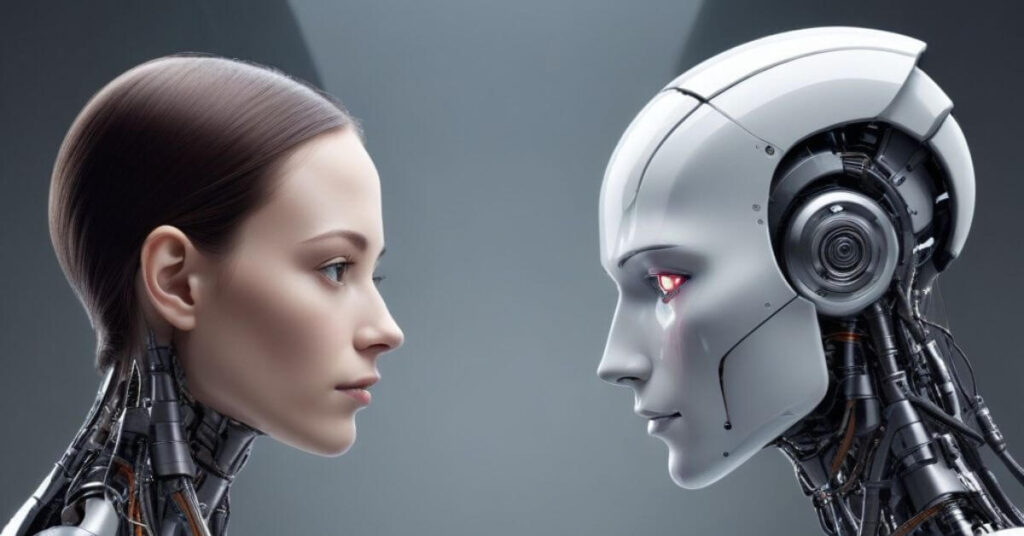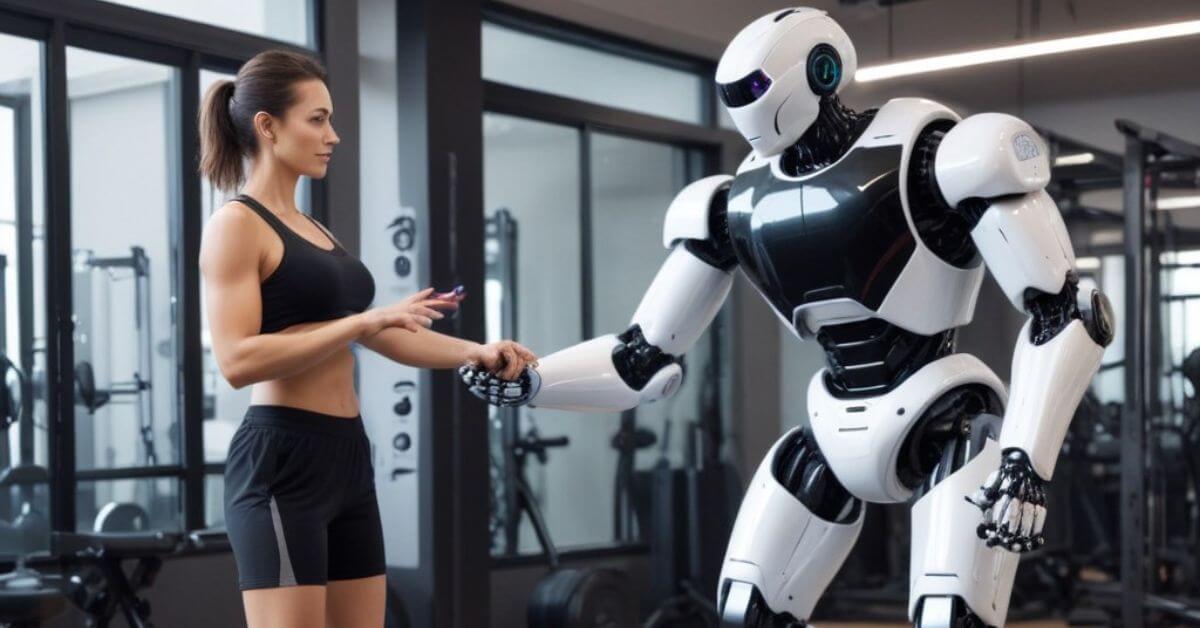Have you ever questioned if your next training partner should be a dependable human trainer or an AI Fitness Trainer? Not surprisingly, given the pervasiveness of AI in our lives, it’s also causing a stir in the fitness industry. AI fitness trainers are gaining traction as a substitute, offering real-time feedback and customized training regimens.
But do they actually offer any advantages over a personal fitness instructor?
Let’s see which one would be the best suit for you!
Let’s answer the question “Is an AI Fitness Trainer Better than a Human Fitness Trainer in Real Life?”

1. Personalization and Adaptability
| Human Fitness Trainers | AI Fitness Trainers |
| Human fitness trainers bring a high level of personalization to their training sessions. They can quickly adjust workout routines based on a client’s progress, mood, or physical condition on any given day. Their ability to understand and respond to verbal and non-verbal cues allows them to modify exercises to prevent injury and ensure optimal performance. Human trainers can also consider emotional and psychological factors, offering encouragement and motivation tailored to an individual’s needs. | AI fitness trainers utilize data to provide personalized workout plans. By analyzing user input such as age, weight, fitness level, and goals, AI can create tailored routines. Advanced AI systems can adapt plans based on progress tracked through wearable devices or app interactions. However, AI lacks the ability to perceive nuanced physical cues or emotional states directly. While some advanced AI applications incorporate user feedback to adjust workouts, they cannot fully replace the intuitive adaptability of a human trainer. |
READ MORE: No Equipment, No Problem: Mastering Workouts Without Gear
2. Motivation and Accountability
| Human Fitness Trainers | Human Fitness Trainers |
| One of the biggest advantages of human trainers is their ability to motivate and hold clients accountable. They can offer real-time encouragement, adjust their approach based on a client’s emotional state, and create a supportive environment that fosters commitment. The personal relationship built over time can significantly boost a client’s motivation and adherence to their fitness regimen. | AI fitness trainers offer motivation through gamification and progress tracking. Features like rewards, badges, and progress milestones can help maintain user engagement. However, the motivational impact may be less effective compared to the personalized encouragement from a human trainer. AI systems also lack the relational aspect that can drive accountability. While notifications and reminders can help, they may not be as compelling as a scheduled session with a human trainer. |
3. Expertise and Guidance
| Human Fitness Trainers | AI Fitness Trainers |
| Human trainers bring extensive knowledge and experience to the table. They can demonstrate proper form, offer immediate corrections, and provide in-depth explanations of exercises. Their expertise is invaluable for beginners who need detailed guidance and for advanced trainees looking to perfect their techniques. Human trainers can also incorporate a variety of training methods and equipment based on their professional judgment and experience. | AI fitness trainers rely on a database of exercises and predefined routines. While they can provide videos and instructions, the guidance is limited to the content programmed into the system. Some advanced AI systems use motion detection to offer real-time feedback on form, but this technology is still developing and may not be as precise as human observation. Additionally, AI trainers may not be able to adapt to the unique nuances of each exercise or individual’s biomechanics. |
4. Cost and Accessibility
| Human Fitness Trainers | AI Fitness Trainers |
| Cost is a significant factor when choosing a fitness trainer. Personal trainers can be expensive, with rates varying widely based on location, expertise, and session length. This cost can be a barrier for many people. Additionally, scheduling sessions can be challenging, especially for those with busy lifestyles. Access to quality trainers can also be limited in certain geographic areas. | AI fitness trainers are typically more affordable than their human counterparts. Many AI-driven fitness apps offer subscription-based models that are cost-effective. They provide the convenience of working out anytime, anywhere, making fitness more accessible to a broader audience. This flexibility is particularly beneficial for individuals with tight schedules or those living in remote areas without access to quality fitness facilities. |
Consistency and Availability
| Human Fitness Trainers | AI Fitness Trainers |
| While human trainers offer personalized service, they are also subject to human limitations such as illness, vacation, or scheduling conflicts. This can lead to inconsistencies in training sessions. Finding a consistent time that works for both the trainer and the client can sometimes be a challenge. | AI fitness trainers are available 24/7, offering unparalleled consistency. Users can access their workouts whenever they fit their schedule, ensuring they never miss a session. This constant availability can be a significant advantage for maintaining a regular fitness routine. |
Conclusion
Choosing between an AI fitness trainer and a human fitness trainer depends on individual preferences, goals, and circumstances.
AI fitness trainers excel in cost-effectiveness, accessibility, and consistency, making them a great option for those with busy schedules or limited budgets. However, human trainers offer unparalleled personalization, motivation, and emotional support, which are invaluable for many people.

Looking for an AI Personal Trainer at just $10/month?
FAQs
Can an AI fitness trainer provide personalized workout plans like a human trainer?
Yes, AI fitness trainers can provide personalized workout plans based on user data such as age, weight, fitness level, and goals. Advanced AI systems use algorithms to adapt these plans as users progress.
However, while AI can offer tailored routines and adapt to tracked progress, it may not be as precise in recognizing nuanced physical cues or emotional states that influence performance. Human trainers excel in this area, as they can quickly adjust workouts in response to real-time observations and personal interactions.
How do AI fitness trainers ensure motivation and accountability compared to human trainers?
AI fitness trainers use features like gamification, progress tracking, and reminders to keep users motivated and accountable. They offer rewards, badges, and milestones to encourage consistent engagement.
However, these methods may lack the personal touch and relational accountability provided by human trainers, who can offer real-time encouragement and adapt motivational strategies to an individual’s needs. The personal relationship and scheduled sessions with human trainers often result in a stronger sense of commitment and accountability.
Are AI fitness trainers cost-effective compared to human fitness trainers?
Yes, AI fitness trainers are generally more cost-effective than human fitness trainers. Many AI-driven fitness apps offer subscription-based models that are affordable and provide access to a wide range of workout plans and progress-tracking tools.
This makes fitness more accessible to a broader audience, especially those with limited budgets. On the other hand, human trainers can be expensive due to personalized service, expertise, and in-person guidance. For many, the lower cost of AI trainers is a significant advantage.
Can AI fitness trainers replace human trainers entirely?
AI fitness trainers cannot entirely replace human trainers at this stage. While they offer cost-effective, convenient, and personalized workout plans, they lack the ability to perceive nuanced physical and emotional cues, provide real-time feedback on form, and build personal relationships that enhance motivation and accountability.
Human trainers bring expertise, adaptability, and emotional support that are critical for many individuals’ fitness journeys.




